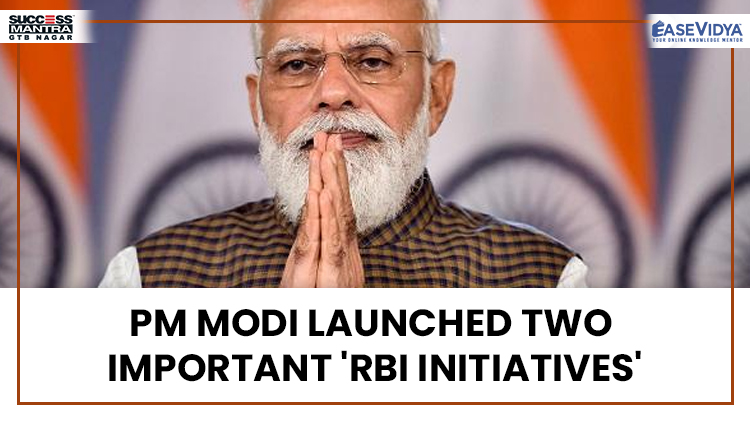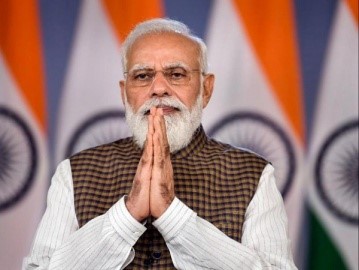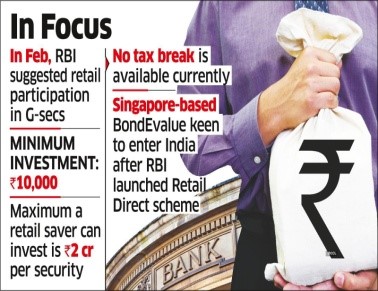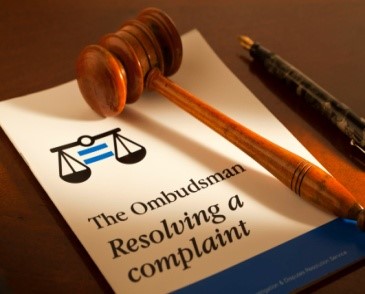
PM MODI LAUNCHED TWO IMPORTANT RBI INITIATIVES
PM MODI LAUNCHED TWO IMPORTANT 'RBI INITIATIVES'
Prime Minister Narendra Modi launched two Reserve Bank of India initiatives on November 12, 2021 through video conferencing. The two innovative customer-centric initiatives include the RBI Retail Direct Scheme and the Reserve Bank - Integrated Ombudsman Scheme.

Current Affairs Notes By Success Mantra Coaching Institute GTB Nagar Delhi CLICK HERE
RBI RETAIL DIRECT SCHEME
- Recently, the Prime Minister has launched the Reserve Bank of India (RBI)- Retail Direct Scheme to open up the Government bond market for the retail investors. In February 2021, RBI proposed to allow retail investors to open gilt accounts with the central bank to invest in Government securities (G-secs) directly. Under the scheme, retail investors (individuals) will have the facility to open and maintain the ‘Retail Direct Gilt Account’ (RDG Account) with the RBI. Retail Investor is a non-professional investor who buys and sells securities or funds that contain a basket of securities such as mutual funds and Exchange Traded Funds (ETFs). A Gilt Account can be compared with a bank account, except that the account is debited or credited with treasury bills or government securities instead of money. The scheme places India in a list of select few countries offering such a facility.
- Aim: The move is aimed at diversifying the government securities market, which is dominated by institutional investors such as banks, insurance companies, mutual funds and others. While foreign portfolio investors were allowed to invest in G-secs, their holding is around 2-3% in the overall market.
- Scope: It offers a portal avenue to invest in Central government securities, treasury bills, State development loans and sovereign gold bonds. They can invest in primary as well as secondary market government securities markets. Negotiated Dealing System-Order Matching Segment (NDS-OM) means RBI’s screen based, anonymous electronic order matching system for trading in Government securities in the secondary market.
SIGNIFICANCE OF THE SCHEME
- Building an Atmanirbhar Bharat: So far, in the government securities market, small investors class, salaried class, small traders had to invest through banks and mutual funds in an indirect manner.
- Improved Ease of Access: It will make the process of G-sec trading smoother for small investors therefore it will raise retail participation in G-secs and will improve ease of access.
- Facilitate Government Borrowings: This measure together with relaxation in mandatory Hold To Maturity (securities that are purchased to be owned until maturity) provisions will facilitate smooth completion of the government borrowing programme in 2021-22.
- Financialise Domestic Savings: Allowing direct retail participation in the G-Sec market will promote financialisation of a vast pool of domestic savings and could be a game-changer in India’s investment market.

Other Measures Taken to Increase Retail Investment in Government Securities:
Introduction of non-competitive bidding in primary auctions. Non-competitive bidding means the bidder would be able to participate in the auctions of dated government securities without having to quote the yield or price in the bid. Stock exchanges to act as aggregators and facilitators of retail bids. Allowing a specific retail segment in the secondary market. The secondary market is the market where investors buy and sell securities they already own. Primary market deals with new securities being issued for the first time.
PRAVAHINI Current Affairs Notes By Success Mantra Coaching Institute GTB Nagar Delhi CLICK HERE
WHAT IS GOVERNMENT SECURITY?
A G-Sec is a tradable instrument issued by the Central Government or the State Governments. It acknowledges the Government’s debt obligation. Such securities are short term (usually called treasury bills, with original maturities of less than one year- presently issued in three tenors, namely, 91 day, 182 day and 364 day) or long term (usually called Government bonds or dated securities with original maturity of one year or more). In India, the Central Government issues both treasury bills and bonds or dated securities while the State Governments issue only bonds or dated securities, which are called the State Development Loans (SDLs). G-Secs carry practically no risk of default and, hence, are called risk-free gilt-edged instruments. Gilt-edged securities are high-grade investment bonds offered by governments and large corporations as a means of borrowing funds.

RBI INTEGRATED OMBUDSMAN SCHEME
Recently, the Prime Minister has launched the integrated ombudsman scheme. In 2019 the Reserve Bank of India (RBI) had launched the Complaint Management System (CMS) in order to improve the customer experience in the grievance redressal process of banking services.
The PM has also launched the RBI’s Retail Direct Scheme.
WHAT IS OMBUDSMAN?
A government official who deals with complaints made by ordinary people against public organizations. This concept of Ombudsman arrived from Sweden. It means an officer appointed by the Legislature to handle complaints against a service or administrative authority. In India an Ombudsman is appointed to resolve grievances in the following sectors.
- Insurance Ombudsman
- Income Tax Ombudsman
- Banking Ombudsman
It amalgamates three ombudsman schemes of RBI - banking ombudsman scheme of 2006, ombudsman scheme for NBFCs of 2018 and ombudsman scheme of digital transactions of 2019. The unified ombudsman scheme will provide redress of customer complaints involving deficiency in services rendered by RBI regulated entities viz. banks, NBFCs (Non banking Financial Companies) and pre-paid instrument players if the grievance is not resolved to the satisfaction of the customers or not replied within a period of 30 days by the regulated entity. It also includes non-scheduled primary co-operative banks with a deposit size of Rs 50 crore and above. The integrated scheme makes it a “One Nation One Ombudsman’ approach and jurisdiction neutral.
Need: The first ombudsman scheme was rolled out in the 1990s. The system was always viewed as an issue by consumers. One of the primary concerns was the lack of maintainable grounds on which the consumer could challenge the actions of a regulated entity at the ombudsman or a rejection of the complaint on technical grounds, resulting in a preference for the consumer court notwithstanding the extended timelines for redressal. The move to integrate the systems (banking, NBFC, and digital payments) and expand the grounds for complaints is expected to see a positive response from consumers.
FEATURES OF THE SCHEME
- The Scheme defines ‘deficiency in service’ as the ground for filing a complaint, with a specified list of exclusions. Therefore, the complaints would no longer be rejected simply on account of “not covered under the grounds listed in the scheme”. The scheme is jurisdiction neutral and a centralised receipt and processing centre has been set-up in Chandigarh for initial handling of complaints in any language. RBI had created a provision for the use of Artificial Intelligence tools so that banks and investigating agencies could coordinate in a better way in the fastest time possible. The bank customers will be able to file complaints, submit documents, track status, and give feedback through a single email address. There will also be a multilingual toll-free number that will provide all relevant information on grievance redress. The regulated entity will not have any right to appeal in cases where an award is issued by the ombudsman against it for not furnishing satisfactory and timely information.
- Appellate Authority: RBI’s Executive Director-in charge of Consumer Education and Protection Department would be the Appellate Authority under the integrated scheme.

SIGNIFICANCE OF THE SCHEME
This will help in improving the grievance redress mechanism for resolving customer complaints against RBI's regulated entities. It is expected to ensure uniformity and streamlined user-friendly mechanisms which will add value to the scheme and bring customer delight and financial inclusion. 44 crore loan account holders and 220 crore deposit account holders would directly benefit from the single ombudsman, they would now be able to lodge a complaint and track their complaints on the same platform.












0 Comment